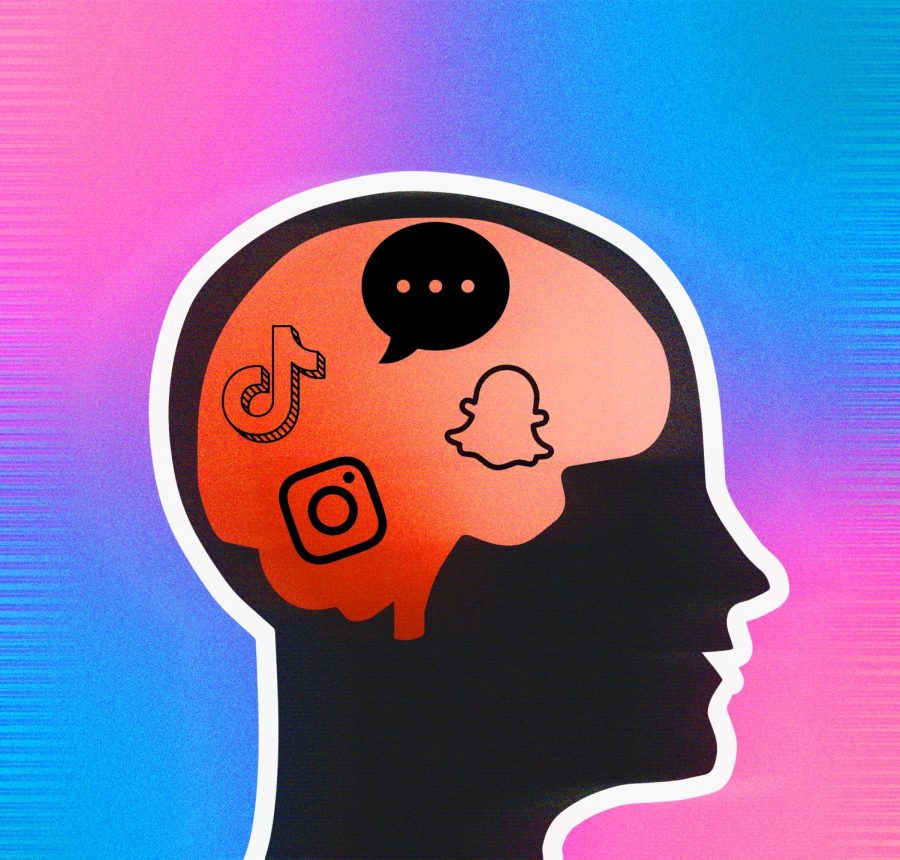Social media portrays a false sense of reality that detriments the mental health of heavy users. It has a record-breaking influence on the world, and is glamorized by users and influencers but has negative effects on mental health that can even turn fatal.
This is not a new theory circulating the internet, created by pseudo-psychologists. The damage social media imposes is supported by extensive research and has caused a mental health crisis within the past decade.
Instagram quickly gained popularity as celebrities gave fans never-before-seen insight into their lives. People who had never met in real life were able to meet digitally and became best friends. These apps gave people a new way to show off their lives to their followers. It was a cultural reset that has had significant impacts in recent history, but it’s not as picture-perfect as it may seem.
A survey done by ChildTrends, the nation’s lead nonprofit research organization, indicates that suicide attempt rates in teens rose by 25% between 2009 and 2017. This rate continues to grow, as suicide is one of the leading causes of death among teens. It’s worth mentioning that female students are typically affected at higher rates.
In addition, researchers from a 2019 study of over 6500 teens found that spending more than 3 hours on social media per day increases the probability of teens struggling with mental health problems, including anxiety, antisocial behavior and depression.
While children and adolescents are likely more susceptible to dealing with the consequences of social media use, adults are also affected. The pandemic increased the amount of time people spent on these platforms, and a 2021 study shows that using excessive screen time to cope with the pandemic correlates with worse mental health in college students.
While those statistics sound frightening, it gets worse. Patterns of association were found amid social media use and disordered eating developing at younger ages than previously reported. Body image issues and low self-esteem are also associated with social media use.
The question that plagues people aware of this crisis is, “Why are these platforms so damaging to the young users that glorify them?”
One of the main reasons is the false reality that influencers on these sites portray. Every time someone posts a picture or a video, they ensure it looks the best. It’s natural for us to showcase ourselves and our lives in the best light possible.
Although it sounds innocent enough, apps that manipulate photos and videos have grown increasingly popular. This creates unrealistic expectations of influencers’ lives and appearances, ultimately becoming the standard for impressionable young minds.
Celebrities on social media platforms are notorious for editing their faces and bodies to fit society’s idea of perfection. Kylie Jenner, who has 310 million followers on Instagram, has been caught altering her pictures on multiple occasions. It’s harmful for children to see these photos because it can impact their perception of reality and cause them to strive for something unrealistic, which can result in overexercising and disordered eating, both can develop into an unhealthy state when gone untreated.
Failure to attain this unreal level of perfection can become an obsession, one that evolves into crushing mental health issues that no one should have to suffer through.
Another issue that has emerged from social media is the use of filters. These started as innocent fun, yet filters have brought up multiple scandals and controversies throughout the past half-decade. In 2015, Snapchat first unveiled the dog ears filter and other overlays that users could add onto photos and videos, and users were in a chokehold. It seemed as though every selfie had an artificial flower crown or another popular filter on it.
Filters progressed from cute cartoons to makeup looks that could add a new dimension to your look. That evolved further to the excessive altering of face shapes such as making jawlines smaller, decreasing nose size, increasing lip plumpness and even lightening skin. These apps take a person’s natural features, something they should see as beautiful and cherish, and morph them to fit a Euro-centric beauty standard that these platforms constantly promote.
With the number of social media users nearing 4 billion in 2022, it’s safe to say that these platforms are not going anywhere in spite of the damage they cause. Platforms should make an effort to be transparent about the true, altered nature of pictures and videos by providing a disclaimer.
Sadly, it does not seem to be a likely possibility because it goes against the influencers that draw traffic and increase the site’s popularity. Therefore, it is up to users to educate themselves on the harmful effects of social media. Cutting back on social media use, being aware of photo manipulations, discontinuing the use of filters and understanding that the lives depicted are not what they seem, are a few ways to enjoy these apps without feeling the negativity that can come with them.
The obvious solution anyone would suggest is to simply quit using social media but it’s not that easy. Social media is designed to be addictive. A 2018 study conducted by researchers at Harvard found that validation from likes on social media stimulates the brain similar to how cocaine does, just not as intensely.
It’s important to remember that social media is not inherently bad or evil. These platforms provide connections that would not physically be possible, but people lying and altering their appearances can be detrimental. It’s okay to not always feel confident about yourself and to struggle with mental health, but resources are available when help is needed.
It may be hard but taking a break and putting down your phone or even taking it a step further and deleting your social media can be the boost you need to start improving mental health and feeling better.
Carrington Power can be reached at orionmanagingeditior@gmail.com.








